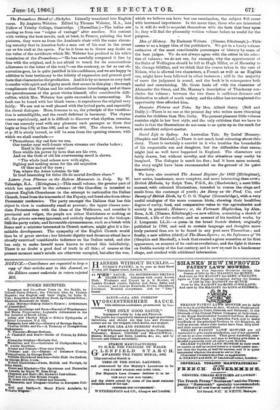The Prometheus Bertnetof ./Eschylus. Literally translated into English. verse. By
A.uguata•Webster. Edited by Thomas Webster, MA., late Fellow of Trinity College, Cambridge. (Macmillan.)—The• ladies are ousting. us from one "coigne of vantage" after another. Not content with writing the best novels, and, at least, in France, painting, the best pictures, they wave as from the Academic °hair :with the same charm- ing serenity that in America looks a man out of his seat in the street car or•his stall at the opera. Far be it from us to throw any doubt on the value of the certificate which Mr. Webster haa prefixed to his wife's, translation 'of thirPrometheus,—"He•haa carefully compared it line by line with the original, and is not afraid to vouch for its conscientious adherence to the letter of the text,'-'—on the contrary, as far as our ob- servation goes, he is quite justified in his confidence, and we are happy in addition to bear testimony to the felicity of expression and general good taste that characterize theproduction. Audit is by no means an easy task to render with spirit and dignity much that occurs in this play ; thorough compliments that Vulcan and his subordinates interchange, and at times thequerrdousness of the great. victim himself, offer considerable diffi- cultiee, which Mrs. Webster has quite succeeded in surmounting. No fault can be found with her blank verse ; it reproduces the original very fairly./ We are not so well pleased with the lyrical parts, and especially the choral dialogue. Here, itseems to us, the principle of the versifica. tion is unintelligible, and the result deficient in harmony. The rhyme- ceases capriciously, and it is difficult to discover what rhythm remains. One can scarcely read with any pleasure such passages as those that beginetliae-470,-'atlins 586, and at line- 606. The chorus, however, at p. 38 is nicely turned, as will be seen from the opening stanzas, with which we shall conclude :—
" Prometheus,• thy sad fate we rut, Our tender eyes well-founts whose streams our cheeks bedew; Hard is the present case! Zeus wields his power by laws that are his own
And- on the Gods of old his overweening mood is shown.
"The whole land echoes now with sighs, Sighing and making moan for the old majesties Of 'thee- and of thy -race ; Yee, where the Asian colonies' lie'fair In loud lamenting for thine ills do mortal dwellers share."






























 Previous page
Previous page